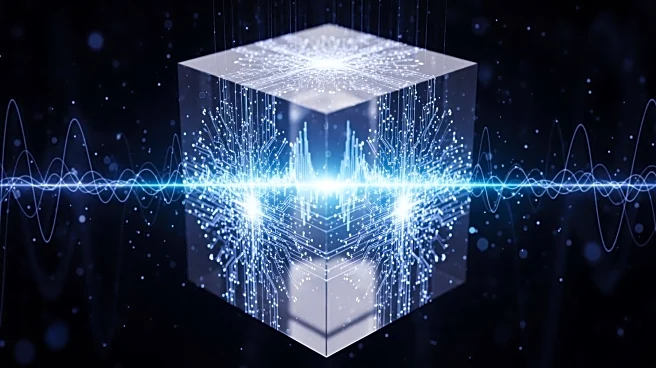What's Happening?
A team of researchers led by Professor Weiping Zhang at Shanghai Jiao Tong University and Professor Liqing Chen at East China Normal University has developed a Raman quantum memory with near-unity efficiency
and fidelity. This advancement addresses a longstanding challenge in quantum information processing, where high efficiency and fidelity are crucial for storing and retrieving quantum information. The new approach leverages atom-light interactions, specifically a far-off resonant Raman scheme, to achieve an efficiency of 94.6% and a fidelity of 98.91%. This breakthrough reduces noise and enhances the reliability of quantum memories, which are essential for real-world applications.
Why It's Important?
The development of high-performance quantum memories is vital for advancing quantum information technologies, including quantum computing and communication. By achieving near-unity efficiency and fidelity, this research overcomes previous limitations that hindered the practical use of quantum memories. The ability to store and retrieve quantum information accurately is crucial for the development of fault-tolerant quantum computing architectures and quantum networks. This advancement could lead to significant improvements in long-distance quantum communication and distributed quantum sensing systems, potentially transforming industries reliant on secure and efficient data processing.
What's Next?
The researchers plan to further explore new physics-driven principles and integrate the quantum memory into quantum repeaters, which are essential for building robust quantum networks. These efforts aim to enhance fault-tolerant quantum computing architectures, paving the way for more reliable and scalable quantum technologies. Continued research in this area could lead to breakthroughs in quantum communication and computing, offering new possibilities for secure data transmission and processing across vast distances.
Beyond the Headlines
The implications of this research extend beyond immediate technological advancements. The ability to achieve high efficiency and fidelity in quantum memories may influence ethical and legal considerations in data security and privacy. As quantum technologies become more integrated into everyday applications, there will be a need to address potential challenges related to data protection and the ethical use of quantum computing capabilities.









